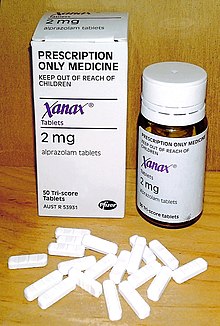Where Did That h/t Come From? | Merriam-Webster
https://www.merriam-webster.com/words-at-play/what-does-ht-mean-on-twitter
此藥在中國通常為0.4mg/片的片劑,臨床一般用於抗焦慮和催眠。該藥的藥效與氯硝西泮的鎮靜作用不同,又有一定改善情緒的作用,因而佳靜安定多用於抑鬱伴有失眠或焦慮的患者,而氯硝西泮多用於興奮躁動的患者。
不良反應[編輯]
過敏反應不太可能發生。唯一常見的副作用是開始治療時嗜睡症狀。
可能的副作用包括:
- 失控(Disinhibition)[3]
- 性慾變化[4]
- 黃疸(非常罕見)[5]
- 幻覺(罕見)[6]
- 口乾(不頻繁)[7]
- 失調、鬆弛發音[8]
- 自殺意念(Suicidal ideation)(罕見)[9][10]
- 尿瀦留(不頻繁)[11]
- 疹、通氣不足(respiratory depression)、便秘[12][13]
- 順行性遺忘症[14] 及注意集中等問題
- 睡意(Somnolence)、暈眩(dizziness)、頭暈(lightheadedness)、疲倦、不穩定及受損的運動協調、眩暈(vertigo)[12][13]
異常反應[編輯]
雖然是不尋常,下面的異常反應已被證實會發生:
- 侵略[15]
- 憤怒(Rage (emotion))、敵意[3]
- 震顫(Fasciculations)及手震[16]
- 瘋狂(Mania)、躁動(Psychomotor agitation)、肺熱(hyperactivity)及"慌張"(restlessness)[17][18][19]
Obiter dictum (more usually used in the plural, obiter dicta) is Latin for a word said "by the way",[1] that is, a remark in a judgment that is "said in passing". It is a concept derived from English common law, whereby a judgment comprises only two elements: ratio decidendi and obiter dicta. For the purposes of judicial precedent, ratio decidendi is binding, whereas obiter dicta are persuasive only.
傍論(ぼうろん、羅:Obiter dictum、オビタ・ディクタム)とは、英米法の概念で、判決文の中の判決理由において示された裁判所(裁判官)の意見の内、判決の主文の直接の理由であって判例法としての法的拘束力が認められる判決理由の核心部分(羅:ratio decidendi、レイシオ・デシデンダイ)に、含まれない部分。



沒有留言:
張貼留言